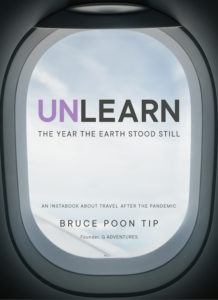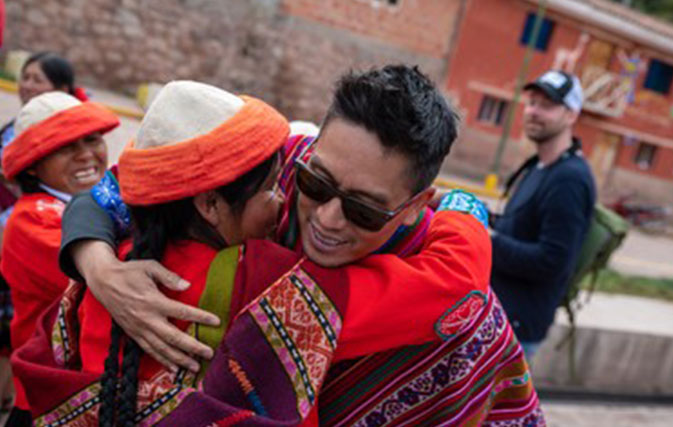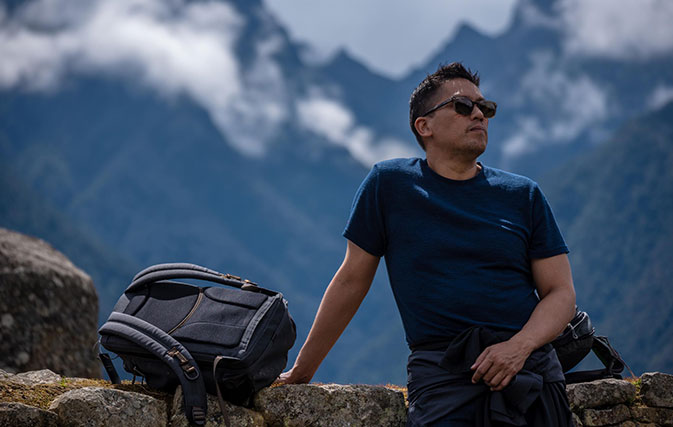TORONTO — As someone who hasn’t been at home for more than two months at a time in the past 30 years, Bruce Poon Tip had a tough go at first adapting to self-isolation. But the COVID-19 pandemic has forced the founder of G Adventures to sit still (for once) and think about the “potential and possibilities” of this very difficult time.
 So he wrote a book, or rather an “instabook” – a term he coined – titled ‘Unlearn: The Year the Earth Stood Still,’ which first started out as a love letter to travellers but ended up being a “somewhat fantasy novel” about the reinvention of the travel industry in the midst of COVID-19.
So he wrote a book, or rather an “instabook” – a term he coined – titled ‘Unlearn: The Year the Earth Stood Still,’ which first started out as a love letter to travellers but ended up being a “somewhat fantasy novel” about the reinvention of the travel industry in the midst of COVID-19.
“We’re all at ground zero right now as travel companies, which has created the opportunity for the world’s largest start-up economy,” he said during a virtual press conference this morning. “We have a chance after all these years to reinvent ourselves as an industry. I’m a believer that travellers create the demand for change – it’s the power and privilege of purchase that creates entrepreneurs like myself and businesses of all sizes to change.”
G Adventures, like all travel companies around the world, has been severely impacted by the pandemic, suspending all tours departing up to and including June 30, 2020. Prior to the outbreak, the small-group adventure company was experiencing record highs, with 30% growth in December 2019 followed by an “incredible” 40% growth in January 2020.
Now, with the future of travel still looking uncertain, Poon Tip is sharing his message of hope in his new instabook and doing his best to visualize when travel will resume, how travel will be different post-COVID-19, and the new travel trends that will arise as a result of the pandemic. He also spoke exclusively with Travelweek to provide tips for travel agents on how to ease client concerns during this time of uncertainty. Here’s what he had to say:
1. As the founder of a leading travel company, can you put into your own words the devastating impact COVID-19 has had on the travel industry?
This is something the world has never seen, let alone just our industry. The world has come to a complete stop, so it’s devastating. It’s even beyond wartime circumstances – people can’t leave their own borders. We have no freedom to leave our own borders or to go anywhere. The world has never seen this at any point, so to describe it, I’d say it’s the most devastating thing we’ve ever seen. What we can’t measure is what it’s going to look like upon return, because I don’t think the industry will be the same, nor will the mindset of the traveller.
2. Do you think travel will bounce back immediately once restrictions are lifted, or do you think it will be a slow and gradual return?
No, I don’t think it will return once restrictions are lifted. Borders opening are the least of our concerns – the biggest problem we have is getting people to fly again. Getting people into a closed space like an airplane again and feeling safe to do so is going to be a challenge. It’s going to be up to the industry to get people comfortable again. People will return but it will be slower until people are confident to fly.
Destinations are already opening up but there’s a difference between when destinations open up and when people are going to travel comfortably again. I know the government of Greece has announced they’re opening up July 1, and a lot of eastern Europe is opening up at the same time. Certain areas of Asia like Korea, Vietnam and Bali, where they locked down very early and are able to change and track people’s movements, are doing very well and have shown amazing bounce back. I think Japan will also rebound quickly, with the pressure of the Olympic deadline next year and their incredible healthcare and technology.
But I don’t think we’re going to have a choice necessarily of where we can travel to. Look at Australia, which is taking some of the hardest stances and talking about locking up the country for a year, in and out. And in the U.S., it’s tragic what’s happening there and the lack of leadership to get this resolved, which will affect us all. This shows how connected we are as a planet – we’re not going to heal as a planet until we’re all in this together.
We’ll look into destinations that have proper testing and tracing, which can actually certifiably confirm that they’re safe places to go to, and we’ll take it from there in terms of where people can travel to next.

3. What will travel look like post COVID-19?
There will be a lot of transparency in terms of disinfecting areas and surfaces, and there will be more people wanting single rooms. People will be less likely to want to go to crowded resorts or board ships with thousands of people on them. The 60’s plus market is most likely going to be the most affected and how they travel will significantly change. I think they eventually will travel but I doubt they will travel the same without a lot of changes that we need to see in order to make them feel comfortable again.
I do think there will be a group of people who may never travel the same again, or for a very long time or until there’s a vaccine. But I think we’ll also see a rise in independent travel, FIT, special groups and small groups of people coming together as friends and travelling with other groups that they know are taking the same level of precautions that they are.
As human beings, we adapt so quickly and that’s served us well throughout evolutionary times. The greatest example of this is 9-11. It’s normal now to not being allowed to bring liquids on airplanes, we’ve adapted. The vetting process we go through now at airports is so much more intense compared to before 9-11. People have short-term memories when it comes these things, so it will become normal for us to wear a mask now.
4. What do you think has been the most surprising positive outcome to come out of the pandemic so far? And how can travel companies like G build on this positivity moving forward?
My hope is the pandemic has shown the world how connected we are as a planet. This virus started in a city in China and quickly it spread around the world. It shows how connected humankind is. My hope is that people look at that and realize that we’re all on this planet together and it brings people closer to other cultures as opposed to price points and amenities, and the end result is travel becomes what it was meant to be.
5. How will “the new normal” change the way we look at overtourism, the environment and sustainability? Do you think we’ll all be more responsible travellers as a result of COVID-19?
That’s my hope, that some good comes out of this. We have an opportunity in the travel industry to restart everything. We’re at ground zero as an industry and we have an opportunity to present something new to customers that is more compelling and more relevant to where we are in the world today.
6. Health and safety will be top of mind among travellers once the pandemic ends. Do you think there should be a global set of guidelines to ensure such precautions are made?
I don’t believe there should be global standards in general. I do believe certain services like flying, where people are in enclosed spaces, then there has to be some kind of standards. Otherwise, I believe it’s up to individual operators to ensure their customers are safe.
We’re all thinking about our individual strategies, legally, about what we’re going to have to do and how we’re going to differentiate on the other side of this between companies. We will have to employ different things, almost like a core set of values for customers, and people will read them and decide who to travel with based on what each company is doing to make them feel comfortable.
I’m sure there’ll be certification programs to clean surfaces in hotels between visits, sterilization, social distancing and more. Every operator will be responsible to put their stake in the ground. I think we’ll all be copying each other, too, as operators and we’ll all be trading information and best practices. The ultimate goal is to get people comfortable again.
7. What is G doing specifically with regards to health and safety measures on its tours moving forward?
We have just started to have those conversations now. Like everyone else we’ve been busy putting our company into hibernation to wait for when travellers are ready to travel again. We’re starting to talk about what it will look like when they return. The challenge we have is that we deal with a lot of small-scale, family-run businesses around the world, so we’re acting as a point of education for them on how to get their businesses up and running again too. We haven’t hit rock bottom yet, so it’s impossible for us to meet the needs of the customer until we know what we are dealing with, and when.
We used to offer elements of public transport on some of our trips, like a chicken bus in Guatemala for example. It’s an interesting experiencing for some people but I don’t think in the short term we’ll be able to return to that.
8. Do you think travellers will be more likely to travel closer to home post COVID-19? If so, how will G adapt to this new trend?
Yes, in the short-term, people will still want to travel but stay closer to home. My hope is that longer term people feel carefree enough to travel around the world again. We’ve always offered tours locally, but we are looking at how we refine our product for people travelling for shorter periods of time, but also staying local.
9. What advice do you have for travel agents whose clients are simply too afraid to travel until a vaccine is made available?
My main advice right now is to stay in contact with your customers. Nobody knows what’s happening and there’s a lot of misinformation and confusion. That breeds fear, so it’s up to travel agents to be a source of information. They have to interpret it themselves and stay connected to their customers. You want them to believe you are an expert on the topic to build trust for the future.
You have to let people know you’re staying informed, let them know you’re taking all the information as a travel professional and that they should come to you with their concerns about anything to do with travel. You should be the guiding light now when we’re in the middle of the pandemic, so it’s your job to stay on top of all the technologies, read all the scientific studies and engage with them – like how G Adventures is doing – during quarantine. So help them find exercise classes and virtual tours, help them find ways they can still dream but also stay safe. And the minute that it’s safe and comfortable to travel again, you’re going to be there and be ready because you’ve kept them informed the whole way to the best of your ability.
10. We’re seeing casualties already in the travel industry. Bankruptcy is a real threat for many companies. With travel being such an interconnected ecosystem, what is your forecast for the future of the industry?
The landscape of the industry is going to change dramatically. Any business can withstand 60-90 days of disruption. Anything longer than that, six months to a year, that makes it more difficult for companies to survive. The 60-70-plus demographic may never travel the same again. I don’t know how many people will want to put their 80-year-old parents on a cruise ship or go to a compound resort with thousands of people. If even a small percentage of people change how they travel it will change the landscape considerably – my hope is it’s for the better.
To read ‘Unlearn: The Year the Earth Stood Still,’ go to https://unlearn.travel.


